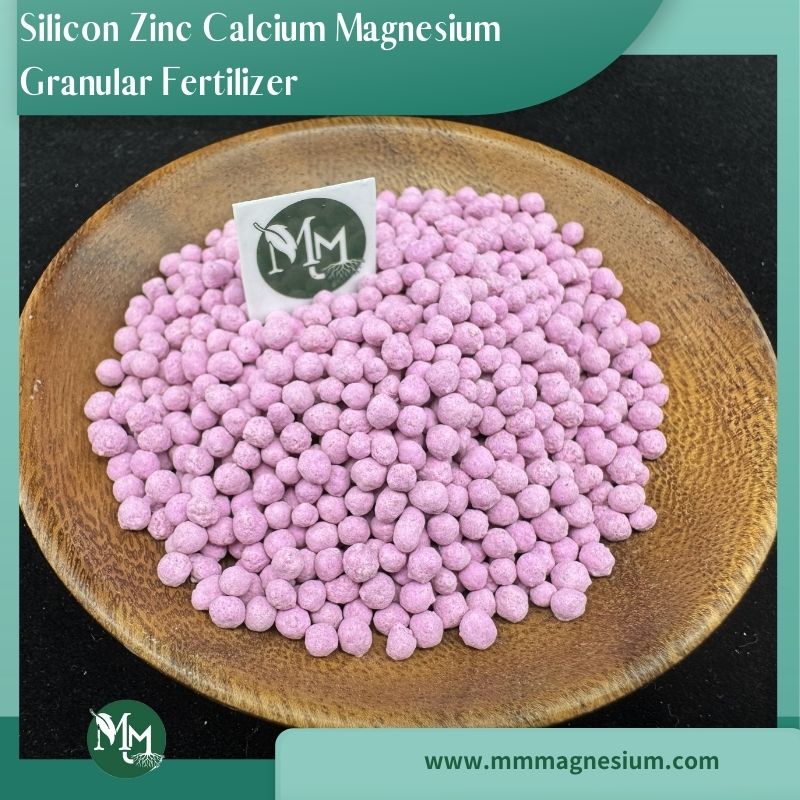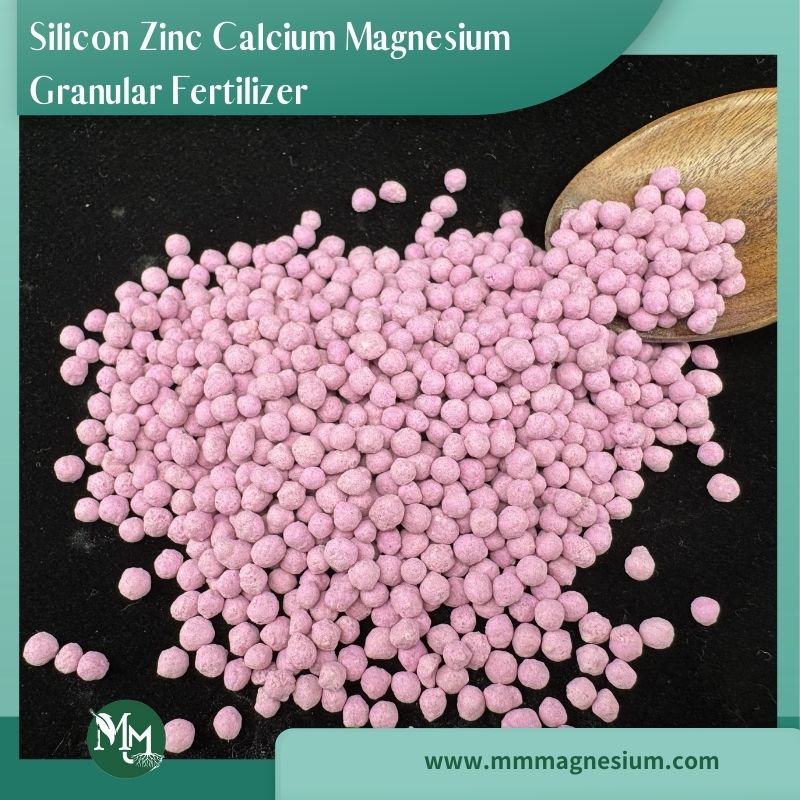

Silicon ≥35%
Calcium ≥22%
Magnesium ≥10%
Zinc ≥0.02%
Granular size:2-4mm
PH value ≥7-10
Applicable crops: Rice, wheat, corn, cotton, soybean, peanut, rapeseed, potato, sweet potato, carrot, vegetables, fruit, flowers, etc.




Yingkou Maomei Agricultural Technology Co., Ltd., relying on high-quality mineral resources, produces silicon zinc calcium magnesium fertilizer products with advanced technology and the following characteristics:
Products are exported to the United States, Russia, Indonesia, Canada, Spain, Malaysia, Bangladesh, and other countries, and also cover all provinces, cities, and regions across the country.
For more service advantages of Yingkou Maomei Agricultural Technology, please see Why choose us? and Factory Photos.
Advantages of Silicon Zinc Calcium Magnesium Fertilizer
1. Improve soil structure and increase soil fertility
The trace element mineral fertilizer of silicon, calcium, magnesium and zinc can effectively improve the soil structure, enhance the water and fertilizer retention capacity of the soil, and improve the root growth and nutrient absorption capacity of crops. According to experimental data, the physical and chemical properties of soil changed significantly after application:
Improved water retention: The addition of silicon can increase the colloidal structure of the soil and improve the water holding capacity of the soil. Generally, it can increase the water holding capacity of the soil by more than 10%.
Enhanced aeration: The effects of calcium and magnesium can improve soil structure, increase soil porosity, and improve soil aeration. Data shows that aeration performance is increased by more than 15%.
2. Provide comprehensive nutrition and enhance crop stress resistance
The trace element mineral fertilizer of silicon, calcium, magnesium and zinc contains comprehensive nutrients, including macroelements and trace elements, which can effectively improve the stress resistance and growth and development ability of crops:
Comprehensive nutrition: In addition to the main silicon, calcium and magnesium, the fertilizer also contains trace elements such as zinc, iron, boron, etc., which can comprehensively supplement the nutrients needed by crops.
Enhanced stress resistance: Silicon element can improve the resistance of plants to diseases and insect pests. Data shows that after application, the incidence of crop diseases is reduced by more than 20%, especially the effect on above-ground diseases is significant.
3. Improve crop yield and quality
Yield increase effect: Experimental results show that under appropriate fertilization amounts, crop yields generally increase by more than 10%, and the yields of some crops such as rice and wheat increase even more, up to 15%.
Quality improvement effect: Magnesium helps to improve the sugar content and quality of fruits. Data shows that after application, the sugar content of fruits increases by 1 percentage point on average, and the fruit tastes better.

Fertilization Recommendations
1.Application time

1. Protect from rain and sunlight, store in a ventilated and dry place, and do not transport or store together with toxic and hazardous substances.
2. Each bag is 25 kg, and we can also provide packaging as small as 1 kg or as large as ton bags according to customer requirements.
3. Plastic woven bags, lined with plastic inner bags. We provide all available packaging such as paper plastic bags/kraft paper bags/PE bags.
4. We provide a variety of transportation methods: road transportation, railway transportation, air transportation, container transportation, and ocean transportation.
5. Our company's marks can provide OEM or neutral marks.

FAQ
1.What crops are suitable for your fertilizers?
Our fertilizers are suitable for a wide range of crops, including cereals, vegetables, fruits, flowers, lawns and ornamental plants. We also have special fertilizers for specific crops to ensure the best growth and harvest.
2.Are samples free?
We can provide some free fertilizer samples, depending on the type and quantity of the samples. In most cases, the samples are free, but the shipping costs need to be borne by you. Please contact our sales team for specifics.

Product Knowledge:How to protect the root system of crops and promote growth?

The root system is the main organ for plants to absorb water and nutrients. It plays a vital role in the growth and development of plants, so the root system determines the yield. During the growth of crops, the change in the color of the root system can reflect its health. As the saying goes: "White roots are strong, yellow roots are life-saving, black roots are sick, and gray roots are fatal."
White roots are strong: White roots are usually the tip of new roots or old roots. These roots have strong oxygen secretion ability, which makes the surrounding soil oxidized, forming an oxidation circle to prevent the accumulation of divalent iron. White roots have strong physiological functions and high absorption capacity, so white roots are strong.
Yellow roots save lives: Yellow roots generally appear on the surface of old roots and root bases, because the cell wall of the outer cortex thickens and trivalent iron is deposited to form a yellow-brown iron film. This iron film has a protective effect, but its absorption capacity is weakened, so yellow roots save lives.
Black roots are sick: Long-term flooding leads to insufficient oxygen in the soil, and divalent iron and hydrogen sulfide combine to form black ferrous sulfide that precipitates on the root surface, making the roots black and physiological functions decline, so black roots are sick.
Gray roots are fatal: When the soil is iron-deficient, hydrogen sulfide cannot be eliminated, inhibiting the respiration and absorption function of the root system, leading to root poisoning and death. Gray roots are water-soaked and accompanied by the smell of rotten eggs, so gray roots are fatal.
In order to protect the root system of crops and promote growth, the following measures are recommended:
1. Reasonable fertilization: Ensure that the soil nutrients are balanced, and apply organic fertilizers, inorganic fertilizers or functional fertilizers scientifically according to the needs of crops and soil test results.
2. Optimize irrigation management: Adopt a reasonable irrigation system, such as drip irrigation, micro-sprinkler irrigation, etc., avoid excessive irrigation or drought, and maintain appropriate soil moisture.
3. Improve soil quality: Add organic matter, improve soil structure, promote soil microbial activity, and facilitate root growth and nutrient absorption.
4. Prevent and control root diseases: Regularly check the health of the root system, pay attention to the prevention and treatment of root diseases, and use biological control or environmentally friendly chemical control methods.
5. Timely loosening of the soil: Intertillage or light tillage of the soil, keep the soil loose, enhance soil aeration and water permeability, and facilitate root growth and development.
6. Control soil salinization: Pay attention to soil salinity and prevent the adverse effects of soil salinization on the root system through reasonable fertilization, irrigation and soil improvement measures.
7. Monitor soil pH: Regularly test soil pH and adjust soil pH when necessary to ensure a suitable growth environment.
8. Protect the root growth environment: Avoid mechanical damage to the root system, protect the plant root area, and avoid contamination of the root system by harmful chemicals or heavy metals.
Yingkou Maomei Agricultural Technology Co., Ltd
Name: Brenda
Mobile:86-188-7490-2028
Tel:86-400-699-8826
Whatsapp:86-18874902028
Email:info@maomeimg.com
Add:Qianjia Village, Nanlou Economic Development Zone, Yingkou City, Liaoning Province, China